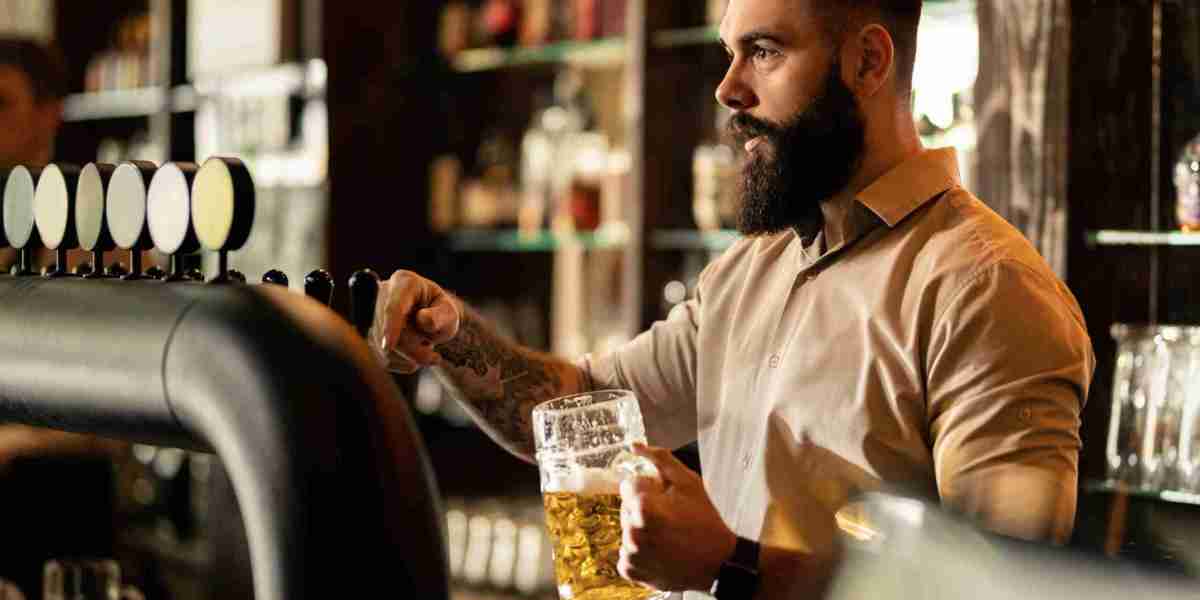If you want to sell alcohol or run a location that serves alcohol in London, you must first get a personal licence. Whether you are a pub owner, a pub manager, or a retail worker selling alcohol, a personal license ensures that you meet legal requirements while maintaining high safety and responsibility standards.
At SafetyMark Training, we specialise in delivering the necessary tools and training courses to assist you in obtaining the certifications you require. In this blog post, we will go over all you need to know about the personal license procedure in London, including its relevance and how SafetyMark Training can help you along the way.
What is a personal license?
A personal license is a local authority-issued certificate that authorises an individual to sell alcohol on licensed premises. In the United Kingdom, everyone involved in the sale of alcohol, whether pouring drinks in a bar, selling alcohol in a store, or supervising a venue's alcohol-related activities, must hold a personal licence. This certification confirms that you are legally liable for the sale of alcohol and that you are aware of the regulations governing alcohol usage.
Why do you need a personal license?
The Licensing Act 2003 oversees the selling of alcohol in England and Wales, and a personal license ensures that you follow the requirements. Without it, selling alcohol or being in charge of alcohol sales can result in serious consequences, such as large fines or jail.
A personal license is essential for supervisors and managers in licensed premises. It demonstrates knowledge of key legal responsibilities, including age verification, responsible alcohol consumption, and dealing with intoxicated customers to minimise harm to individuals and others.
• Ensure public safety in your venue.
This license is not just required for your position; it is also a crucial step towards avoiding legal issues and maintaining a responsible alcohol-serving environment.
Who Needs a Personal License in London?
Individuals who are in charge of authorised alcohol sales in licensed establishments must hold a personal license. The following are the key roles that require a personal license:
1. Premises License Holders: To lawfully sell alcohol, premises license holders for bars, restaurants, pubs, and other alcohol-serving establishments must also obtain a personal license.
2. Designated Premises Supervisors (DPS) require a personal licence. The DPS is responsible for verifying that the sale of alcohol complies with the provisions of the premises license.
3. Staff Members Involved in Alcohol Sales: Personal licenses may be necessary for people selling alcohol in stores, pubs, or supermarkets, depending on venue restrictions.
Understanding if you require a personal license and whether your present position requires one is the first step towards ensuring your company complies with the law.
How to Apply for a Personal License in London?
The process of obtaining a personal license in London is very simple, although it does necessitate careful attention to detail. Here's a step-by-step explanation of what's involved:
1. Meet the eligibility criteria.
Before applying, please ensure that you match the following criteria:
• Age: You must be 18 years or older.
• Clean criminal record: No convictions for significant offences, particularly those involving alcohol or violence.
• Relevant qualifications: The most frequent qualification for a personal license is the Level 2 Award for Personal License Holders (APLH), which is offered by certified training providers such as SafetyMark Training.
2. Complete the Personal Licence Course.
To apply for your personal license, you must finish an official training course. At SafetyMark Training, we provide the Level 2 Award for Personal Licensing Holders (APLH), a certificate recognised throughout the UK. The course covers crucial topics, including the Licensing Act 2003, which explains the legislation governing the selling of alcohol.
• Understanding UK alcohol law: Responsibilities for sellers.
• Preventing underage drinking by verifying age and promoting safe habits.
• Designated Premises Supervisors (DPS) are responsible for managing alcohol sales on premises.
Depending on your preferences, you can complete the course in one day either online or in person. When you pass the exam, you will obtain your certificate, which is essential for your application.
3. Apply to the local authority.
Once you've completed the course and received your certification, you can apply for a personal license from your local council (London Borough). The application requires the following:
• To obtain a personal license, fill out an application form.
• Submit a Criminal Record Bureau (CRB) check to ensure you have no major criminal convictions.
• Qualification Proof: Show documentation that you completed an accredited personal license course (such as one from SafetyMark Training).
• Councils normally charge a fee to process applications, ranging from £37 to £70.
4. Wait for your personal license.
The local authorities will process your application after you submit it. If everything is in order, you will get your personal license. If there are any difficulties (such as criminal convictions or missing documents), the council may request additional information or deny the application.
How Long Does It Take to Obtain a Personal License in London?
Your personal license will usually arrive within 4 to 6 weeks of submitting your application. This time range varies based on the local authorities, so it's critical to plan beforehand.
Cost of a Personal License in London
The cost of getting a personal license in London varies per local council; however, the application price normally ranges between £37 and £70. The cost of the Level 2 Award for Personal Licence Holders course varies by supplier; however, it typically ranges between £150 and £250.
SafetyMark Training strives to provide cheap training and thorough support throughout the application process.
Benefits of Having a Personal License
There are various benefits to having a personal license:
The system ensures legal compliance when selling alcohol.
• Career Advancement: This license is required for many professions in hospitality and retail.
• Demonstrating responsibility and awareness of alcohol rules builds credibility with employers, customers, and authorities.
• Improved responsibility: Learn how to handle alcohol-related situations safely and responsibly.
Quick statistics.
1. Alcohol Sales Industry in the UK.
The UK alcohol business is worth around £52 billion per year, accounting for 10% of total consumer spending on food and drink.
Over 120,000 licensed businesses in the UK, including pubs, restaurants, and stores, require personal licenses for those selling alcohol.
2. Licensing Act 2003 Compliance
In England and Wales, there are over 200,000 personal license holders, as per the latest data. This is a direct effect of the Licensing Act 2003, which requires personal permits for responsible individuals selling alcohol.
3. Underage Alcohol Sales
In 2020, almost 5,000 alcohol sales were detected in test transactions involving underage minors. Personal license holders play an important role in combating such illicit activities by ensuring that adequate age verification procedures are implemented on licensed establishments.
4. Training and certification impact:
According to research, 90% of licensed facilities are more likely to comply with alcohol laws when managers and personnel have undergone recognised personal license training, such as the Level 2 Award for Personal License Holders course.
5. Criminal Convictions and Personal License
Eligibility Criminal convictions have denied approximately 5-7% of personal license applications in recent years. This emphasises the importance of keeping a clean criminal record when qualifying.
6. Revenue derived from fines related to alcohol consumption.
The UK government collects millions of pounds in fines each year as a result of breaches in alcohol sales restrictions. For instance, the UK government recovered £4.5 million in penalties for alcohol-related violations in 2019, highlighting the need for knowledgeable, certified individuals.
These data highlight the size of the UK alcohol business, the need for personal licenses for compliance, and the role of accredited training in guaranteeing legal and responsible alcohol sales.
Why Choose SafetyMark Training?
SafetyMark Training specialises in offering high-quality education and certification services to help you earn your personal license in London. Our courses are approved, reasonably priced, and specifically designed to ensure your successful completion. Our team of professional trainers and comprehensive support are available to assist you at every stage of the process.
We provide both in-person and online training, so you can easily fit the course into your schedule. After finishing the course, you will be able to confidently submit your application for a personal license.
Case Study 1: Liam's New Wine Bar in London
Liam recently launched a fancy wine bar in the centre of London, and he needs a personal license to legally sell alcohol. He enrolled in SafetyMark Training's Level 2 Award for Personal Licence Holders course, which he completed in one day. Liam passed the exam and applied to the local council for his personal license, which he received within five weeks. Now, Liam can comfortably handle alcohol sales at his pub, knowing he is fully compliant with the law, while his business thrives in a competitive market.
Case Study 2: Olivia's Retail Career Growth
Olivia was a team leader at a huge retail business that sold alcohol. Her job required her to have a personal license to oversee alcohol sales and ensure the store followed all applicable requirements. She finished SafetyMark Training's personal license course and passed the exam. Olivia was promoted to a higher managerial position after obtaining her new qualification, and she is now in charge of controlling alcohol sales across different divisions. Her personal license not only improved her legal understanding but also boosted her profession in retail management.
Case Study 3: Ethan's Bar Management Success
Ethan operated a popular Shoreditch pub and required a personal license to serve as the Designated Premises Supervisor (DPS). He enrolled in the approved course of SafetyMark Training, where he learnt the fundamentals of alcohol sales, including age verification and handling intoxicated customers. After passing the exam, Ethan applied for his personal license, which he received within a few weeks. His accreditation qualified him to legally regulate alcohol sales and provide a safe, comfortable environment for clients. With his personal license in hand, Ethan firmly led his team and kept the bar in compliance with the law.
Conclusion
A personal license is more than simply a requirement; it is a valuable tool for ensuring that alcohol sales are carried out safely and responsibly. Whether you work in a bar, restaurant, shop, or venue management, getting your personal license can help you meet legal requirements and contribute to a safer drinking environment. With the help of SafetyMark Training, you can quickly and easily obtain your personal license and begin your journey to responsible alcohol service.
FAQs about obtaining a personal license in London.
1. What is a personal license?
A personal license is a certification that allows you to sell or authorise the sale of alcohol on licensed premises in the United Kingdom. It guarantees that you understand the laws governing alcohol sales and can manage them appropriately.
2. Who requires a personal license?
Anyone in charge of selling or authorising alcohol sales, such as the designated premises supervisor (DPS) or the premises license holder, needs a personal license. In some circumstances, employees who sell alcohol may also need it.
3. How can I apply for a personal license?
To apply, you must finish an accredited Level 2 Award for Personal Licence Holders course, pass the exam, and file an application with your local council. You must show proof of qualification and a criminal record check (CRB).
4. How long does it take to obtain a personal license?
The application procedure typically takes 4 to 6 weeks from submission. This is contingent on the local council's processing time.
5. Do I need a personal licence to work in a pub or restaurant?
Yes, if you work as a manager or are in charge of authorising alcohol sales. If you are a staff member providing alcohol, it may be subject to the venue's policies.







